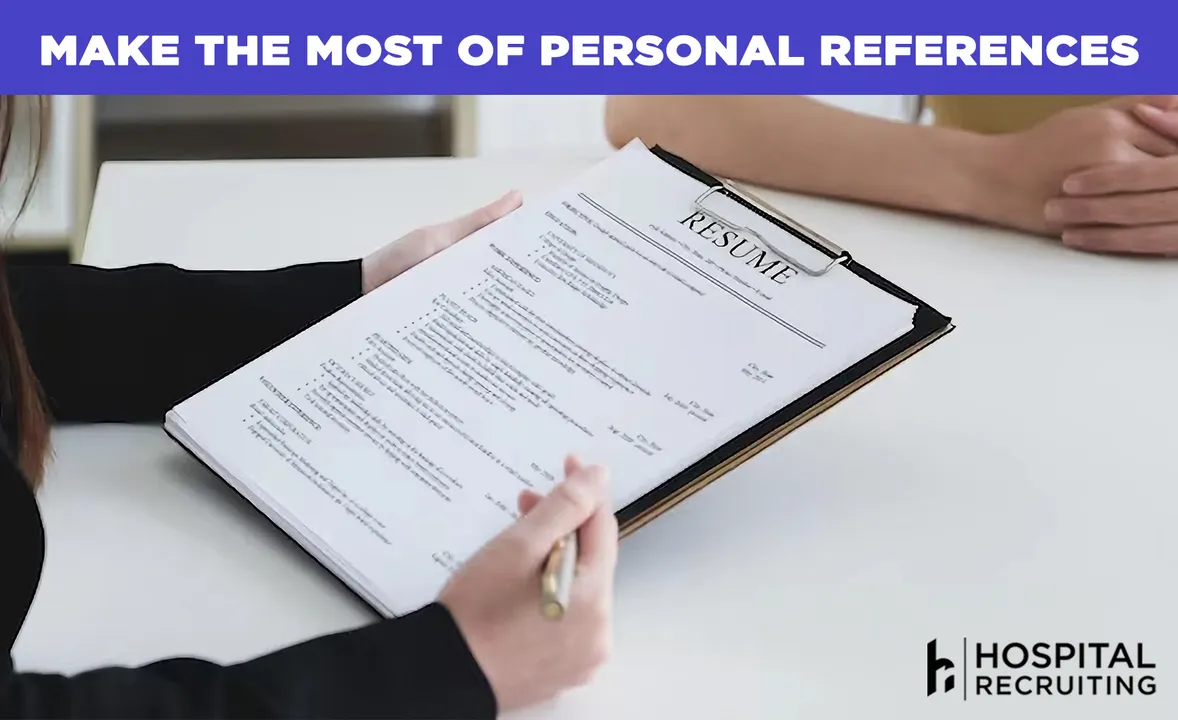How to Make the Most Out of Personal References

When advancing in your healthcare career, personal references can have a significant impact on potential opportunities. They offer an unbiased assessment of your skills, character, and accomplishments. Optimizing how you select and use references could be a game-changer in securing your next role, and it is vital that you understand how to get the most out of your personal references.
Who to Choose (And Not to Choose) as References
Who to Choose
The most foundational part of using references correctly is choosing the right people to be your references. The right reference will be someone who can provide specific, positive, and relevant examples of your work, skills, and professionalism. The best references will be inherently trustworthy and be delighted to be your reference.
Ideal candidates are often former supervisors, colleagues, or academic mentors who have directly observed your contributions and can speak to your abilities and work ethic. They will also be people with whom you are currently in contact. A professor, for example, is a great reference if you’ve just graduated but not as good if you’ve been out of school and out of contact with them for a decade.
Who Not to Choose
Choosing the right references is important; however, avoiding suboptimal references is equally important. Choosing references with whom you've had minimal professional interaction, personal friends, or family members, is not typically ideal, as their testimonials are not likely to hold the same weight or relevance in a professional context.
You should also avoid choosing references that you’re not sure will present you in a good light. If there is a chance that they will be unexcited about you or mix in negative information, you should typically avoid using them as a reference.
How to Approach Potential References
When approaching someone to ask if they can be a reference, be respectful of their time and considerate of their willingness to help. A personal meeting or a phone call can make the request more meaningful. While each approach should be tailored to the individual, steps for approaching a potential reference include:
- Initiating contact with a polite and professional greeting.
- Explain why you value their endorsement specifically.
- Clearly state what you are applying for and why.
- Being upfront about any potential time commitment involved.
- Offering to provide them with your resume or any other relevant documents.
By approaching potential references correctly, you will improve the chances they will be willing to help.
Preparing Your References
Once someone agrees to be your reference, it’s essential to prepare them to speak effectively on your behalf. Start by providing them with an updated copy of your resume and a summary of your key achievements, particularly those relevant to both the position you are aiming for and your interactions with them. This helps them recall specific instances of your work and tailor their recommendation to suit your current job application.
Specific information you should consider providing your references with include:
- Your resume and a brief on the job role.
- Key points they might emphasize based on their experience with you.
- Any relevant projects or accomplishments.
- Updates on your professional growth since they last worked with you.
When choosing what information to share, keep in mind that your reference may not know everything about you that makes you an ideal job candidate, even if they’ve worked with you for years. After sharing information, discuss with them the attributes that are crucial for the job and any points they feel comfortable emphasizing.
Utilizing References Effectively
Incorporating references into your job application process should be strategic. Include references who can provide diverse insights into your abilities and complement each other. For instance, a supervisor might discuss your leadership and project management skills, while a peer could highlight your teamwork and daily work ethic.
It is also important to consider the timing of when to present your references in your job search. It can sometimes be more advantageous to provide them after an initial interview, allowing you to tailor the discussion your references might have based on the interview's direction and feedback.
Continue Building Potential References
The best strategy for getting good references is to have an established relationship already in place when you need the reference. As your career progresses, continue to cultivate potential new references through professional interactions and opportunities.
You might benefit from volunteering for projects that allow you to showcase your skills to a broader audience or in new capacities. Attending professional development seminars and networking events could also give you chances to meet industry leaders and peers who might be valuable references in the future.
Conclusion
Effectively leveraging personal references is an art that can influence your professional advancement. By carefully selecting, preparing, and maintaining relationships with your references, you ensure a network of support that can propel you to new heights in your healthcare career. Remember, the most persuasive references come from those who genuinely appreciate and can attest to your professional capabilities and achievements.
Related Posts
